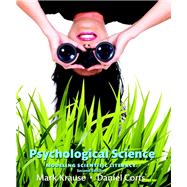This is the eBook of the printed book and may not include any media, website access codes, or print supplements that may come packaged with the bound book.
For courses in Introductory Psychology
Help students become scientifically literate.
Psychological Science: Modeling Scientific Literacy helps students view psychology as a practical, modern science—and gives them the tools to better understand our world. Throughout the second edition, authors Mark Krause and Daniel Corts continue to emphasize scientific literacy: the ability not only to define scientific terminology, but also to understand how it functions, to evaluate it critically, and to apply it to personal and societal matters. In addition to helping students master key course objectives, learning how to think scientifically will enable students to categorize the overwhelming amount of information they encounter, as well as ignite their interest in psychological science.











